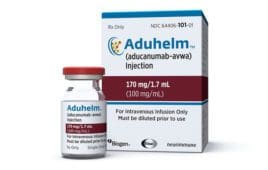 FDA has granted accelerated approval to Leqembi (lecanemab), the amyloid beta-protein inhibitor from Eisai (OTCMKTS:ESALY) and Biogen (Nasdaq:BIIB) at an annual launch price of $26,500.
FDA has granted accelerated approval to Leqembi (lecanemab), the amyloid beta-protein inhibitor from Eisai (OTCMKTS:ESALY) and Biogen (Nasdaq:BIIB) at an annual launch price of $26,500.
The Institute for Clinical and Economic Review (ICER) had decided that the monoclonal antibody lecanemab should be priced less than $20,600 to be cost-effective.
Eisai, which is solely responsible for pricing the drug, explained its rationale for the drug’s price in a press release.
The price for the drug is slightly less than that of aducanumab, the controversial Alzheimer’s drug that costs $28,200 for a person of average weight. Biogen and its partner Eisai initially priced aducanumab at $56,000 in June 2021.
ESALY shares were up about 4% to $64.20 while BIIB shares were up almost 3% to $279.25.
Sweden-based BioArctic Neuroscience was the initial developer of the drug, which was based on research from Uppsala University. Lecanemab is also known as BAN2401.
The FDA approval for the drug limits its use for patients with mild cognitive impairment (MCI) or mild dementia from Alzheimer’s disease who have confirmed amyloid beta.
The Alzheimer’s Association applauded the agency’s decision to approve lecanemab, calling it the “right decision.”
CMS policy currently limits coverage of amyloid-blocking monoclonal antibodies for Alzheimer’s.
Dr. Joanne Pike, Alzheimer’s Association president and chief executive officer, lamented in a statement that CMS is “severely restricting coverage for approved treatments.”
Pike noted that CMS denied coverage of the drug before reviewing its evidence. “CMS has never done this before for any drug, and it is clearly harmful and unfair to those with Alzheimer’s,” she said. “Without access to and coverage of this treatment and others in its class, people are losing days, weeks, months — memories, skills and independence. They’re losing time.”
CMS noted that if lecanemab wins traditional approval that it may “reconsider its current coverage” after a comprehensive review.
Lecanemab had won Fast Track, Priority Review and Breakthrough Therapy designations from FDA.
Lilly’s (NYSE:LLY) is developing a similar drug known as donanemab that could be “perhaps better and cheaper” than aducanumab according to an investor note from Truist.
In 2022, Roche (SWX:ROG) announced that its Alzheimer’s drug candidate gantenerumab flunked two Phase 3 studies.
Filed Under: Neurological Disease





Tell Us What You Think!
You must be logged in to post a comment.